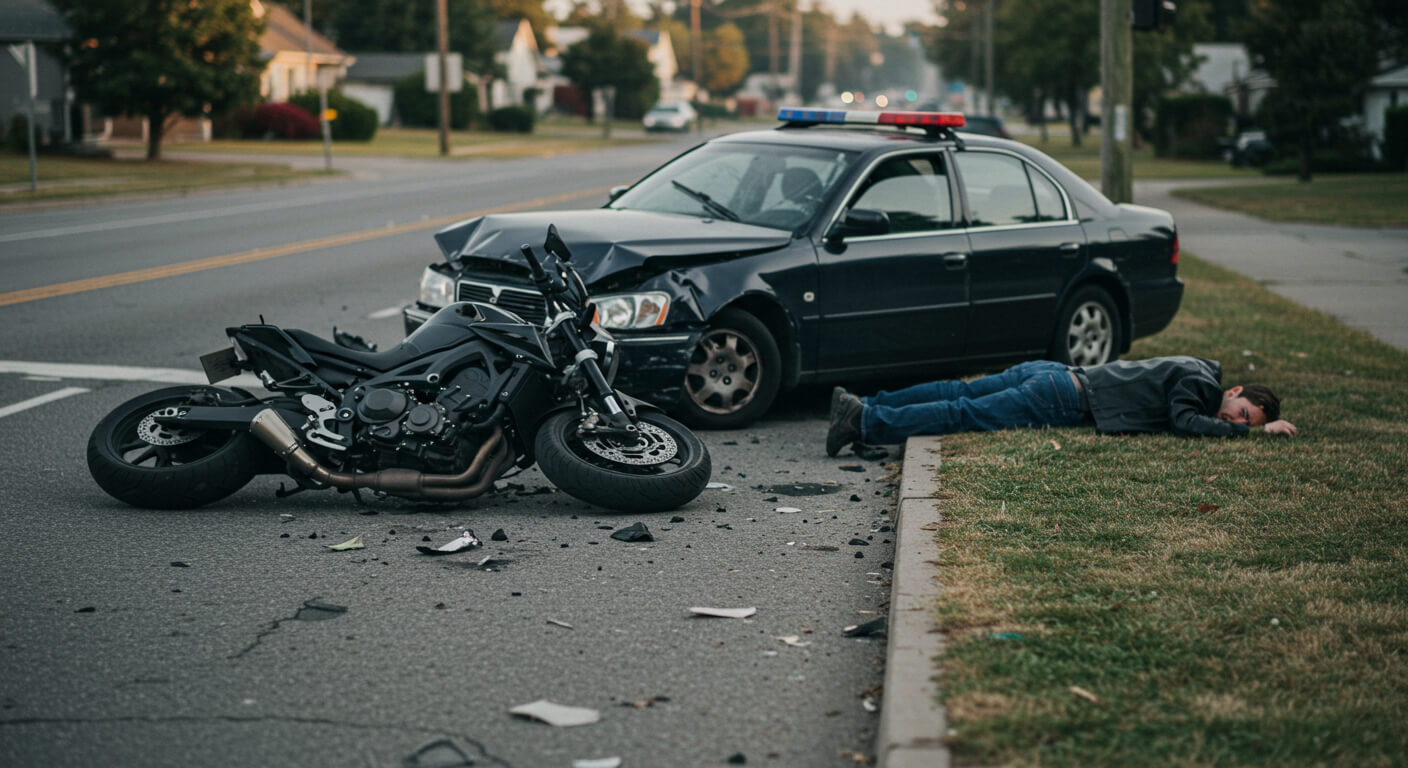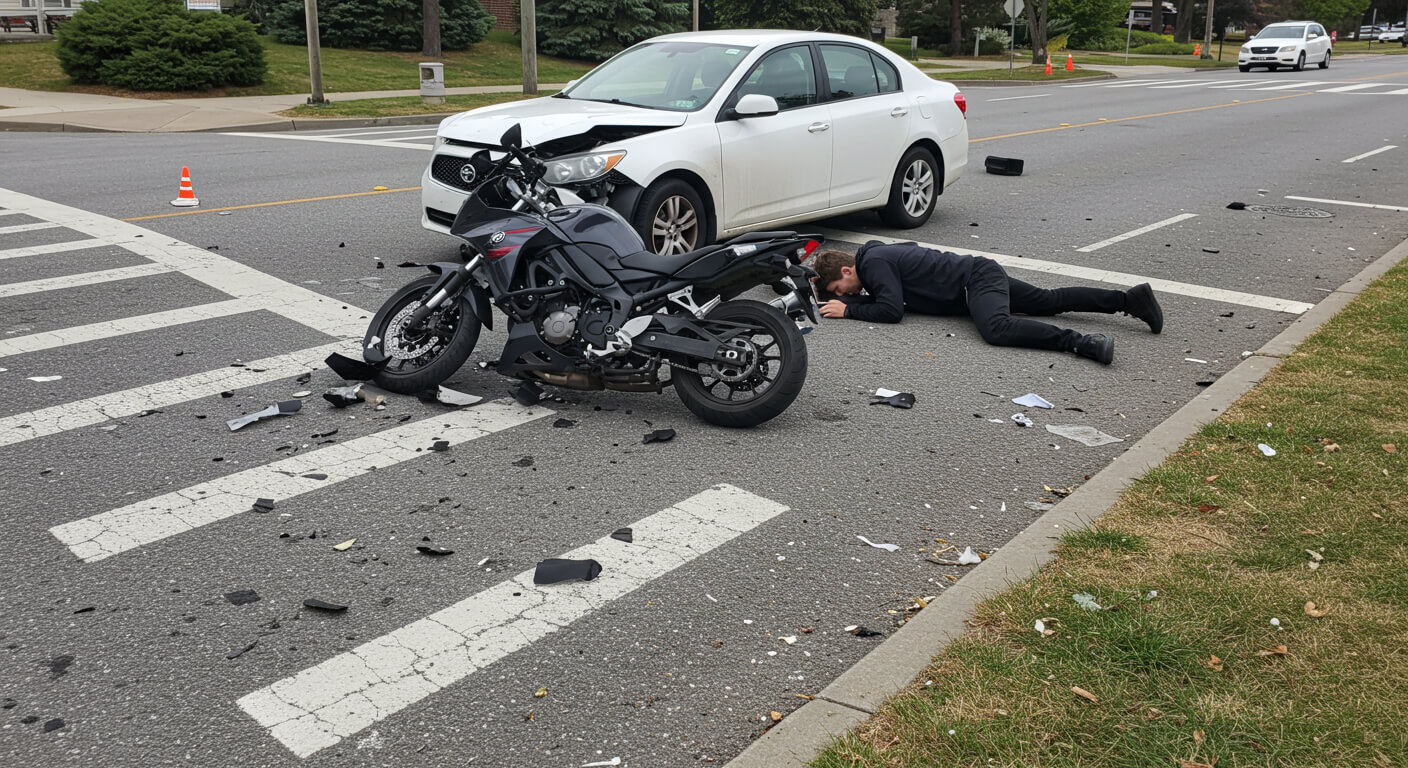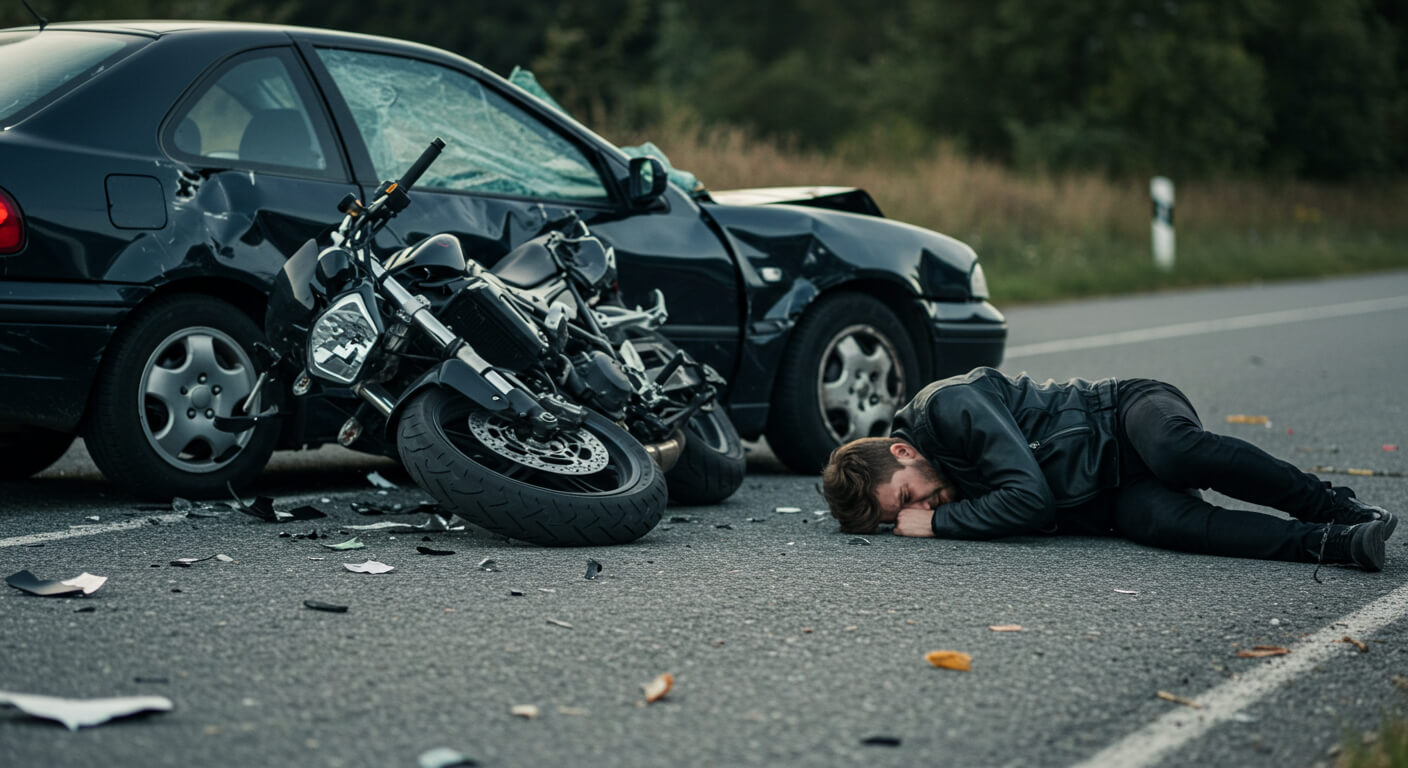
Motorcycle riding offers freedom, but that freedom comes with serious risk.
If you or a loved one has experienced a crash, understanding motorcycle accident injuries is the first step toward recovery and justice. These injuries can be life-altering, both physically and emotionally, and knowing what to expect can make all the difference.
At Alpha Law Group, we’re committed to providing expert legal support to injured riders in Florida on their road to healing.
In this blog, you will learn:
- The 9 most common injuries riders suffer in motorcycle accidents
- Which injuries require immediate and long-term medical care
- Why legal guidance is key to your physical and financial recovery
Let’s take a closer look at the injuries every rider should know about.
9 Most Common Motorcycle Accident Injuries You Should Know About in Florida
Motorcycle crashes can be very dangerous. They often leave riders with serious injuries.
Unlike cars, bikes do not have much protection. This means that the people on the bike get hit harder and may get hurt more often. The most common motorcycle accident injuries include road rash, broken bones, head trauma, spinal cord problems, and internal injuries. Each one can change a person’s life.
The severity of these injuries shows why it is important to know and consider the risks in a motorcycle accident. Injured riders should also get the right medical care and speak with an expert about their rights. Getting help can make a big difference in their recovery.
1. Road Rash
Road rash is one of the most common injuries to occur in motorcycle accidents.
It happens when the skin touches and rubs against the surface of the road. This most often happens if you fall off a bike at high speed. Wearing proper protective clothing, like a leather jacket, can help make the injury less serious, but it will not fully stop you from getting road rash.
Road rash can be different in how bad it gets:
- First-degree road rash leads to mild skin problems, like some irritation.
- Second-degree means the skin is broken, but the deeper parts of the skin do not hurt.
- Third-degree burns will show fat and tissue, and you will need skin grafts and urgent care from a doctor.
If people do not get help in time, these cuts can turn into permanent scarring, serious infections, or nerve damage. Riders should always wear protective clothing to lower the risk of damage.
If an accident happens, get medical help fast so the doctors can treat it the right way.
2. Broken Bones and Fractures
Broken bones and bone fractures happen a lot in motorcycle accidents. This is because the bikes can be hard to control when you crash. Many riders get this type of injury in their arms, wrists, or shoulders when they try to stop themselves from falling. Others get hurt in their legs if the bike falls on top of them.
Often, a bone fracture needs surgery. Doctors may use screws, rods, or pins to fix the problem. If someone gets crush injuries during the crash, it can make the bone damage even worse. This can mean you have a much longer time before you get better.
Bone fractures can be simple, healing in just a few weeks. Some, though, are much more serious. These may mean you need several surgeries and a lot of physical therapy. Riders should wear good protective gear.
It is also important to keep their bikes in good shape. Doing these things can help lower the chances of this type of injury in a crash.
3. Head and Traumatic Brain Injuries
Head injuries are one of the worst things that can happen in motorcycle accidents. This includes traumatic brain injuries, or TBIs. Even when you wear a helmet, you can still get skull fractures or brain damage. This can happen if you fall off your bike or hit another vehicle.
The National Highway Traffic Safety Administration says that traumatic brain injuries are a main reason for deaths among motorcycle riders. These injuries can also cause problems like trouble thinking, trouble speaking, or even being unable to move some parts of your body. You might see signs of head trauma, like vomiting, feeling dizzy, or not being able to move properly. If you see these symptoms, you should get medical help right away.
Head injuries and brain damage from motorcycle accidents can make it hard for you to do normal things from then on. You might need a lot of care and support for a long time. Motorcycle riders should always wear DOT-certified helmets that meet safety rules. This can help lower the chances of serious head trauma in a crash.
4. Spinal Cord Injuries
Spinal cord injuries from motorcycle crashes can change your life. This is because they may cause paralysis or permanent impairment. When the spinal cord gets hurt, nerve functions can be lost. This may make it hard to move, cause sensory loss, or give you ongoing chronic pain.
Here is how different spinal cord injuries can affect you:
| Type of Damage | Potential Effects |
| Blunt force trauma | Chronic pain, swelling, and limited mobility |
| Spinal fractures | Partial or total paralysis |
| Nerve damage | Long-term impairment in motor or sensory functions |
Most of these spinal cord injuries require a long stay in the hospital. You may need surgery and a lot of physical therapy. If you or someone you know is hurt this way, it is a good idea to get legal help. This way, you have a better chance of getting payment for your medical costs and rehabilitation for chronic pain, nerve damage, or any other permanent impairment.
5. Internal Injuries and Organ Damage
Internal injuries can be very dangerous after a motorcycle accident, but you might not see them right away.
When a rider hits the motorcycle’s gas tank with a lot of force, it can hurt the internal organs like the liver, spleen, or kidneys. Internal injuries can also happen if something sharp goes into the body during a crash.
Internal bleeding usually comes with these types of injuries, so it is very important to get medical help as soon as you can. If you have a hurt organ, you might feel pain in your stomach area, see bruises, or feel dizzy. Sometimes, these signs do not show up right after the accident and can take some time.
If not treated, these internal injuries and internal bleeding may cause very bad infections or problems that might need surgery. That is why riders should always get a medical check-up after a crash.
It is the best way to find out if they have any problems inside the body and to get the help they need for a good, safe recovery.
6. Soft Tissue Injuries (Sprains, Strains, and Tears)
Soft tissue injuries are common in people who have a motorcycle accident. These often include sprains, strains, and tears.
They tend to affect things like muscles, tendons, and ligaments. You may have a lot of pain, and it can be hard to move. The pain from these injuries can go from being a little sore to causing chronic pain. Some may even need long-term help, like physical therapy.
Most riders get hurt like this when they hit the road or fall off their motorcycle in an accident. That is why it is very important for motorcycle accident victims to wear proper protective clothing. This helps lower the chance of getting injured and can stop long-term problems.
7. Burns and Abrasions
Burns and scrapes are common and painful after a motorcycle crash.
Burns can result from hot parts on the bike, fires, or skidding on the road’s surface. These burns can be mild or very bad.
Wearing proper protective clothing lowers your risk. You are more prone to injury during a motorcycle crash if you do not have good gear. This can lead to a lot of harm.
Some burns are so bad that you need quick help from a doctor. You could even need skin grafts or a long recovery to heal. To keep safe and avoid these problems, use high-quality protective clothing made to handle rough crashes on the surface of the road.
8. Facial Injuries and Dental Trauma
Facial injuries from a motorcycle accident can include broken noses, broken teeth, and even be so bad that they cause permanent scarring because of blunt force trauma. Riders can get hurt like this if they hit the ground or run into other things during a crash.
These types of injuries can leave permanent marks on the face, which can affect how a person looks and feels about themselves. Some injuries, such as broken teeth, can require more than one surgery to fix them and get their mouth working well again.
Motorcycle accident victims with facial injuries should go to a doctor right away. You should also consider wearing full-face helmets and other safety gear to stay safer. It is a good idea to get legal help so you can ask for money to pay for your medical care and help with the trauma after the accident.
9. Limb Loss or Amputation
Losing a limb or needing an amputation is a serious and lasting injury. This often happens from crush injuries, severe burns, or infections after a motorcycle accident. Doctors sometimes have to remove a limb to stop more problems from happening.
When someone loses a limb, it can be hard both for their body and mind. They must get used to living with a prosthetic device or without a limb. Recovery needs a lot of therapy, medical help, money, and emotional support from others.
Motorcycle accident cases with amputations need strong legal support. This is important so the person hurt can get the maximum compensation for their care and recovery. Our motorcycle injury attorneys know how to help and can guide the victim and their family to get justice after such a bad motorcycle accident.
Final Thoughts
Motorcycle accident injuries can change lives in an instant—physically, emotionally, and financially.
From road rash and broken bones to more devastating trauma like spinal cord injuries or amputations, the aftermath of a crash often requires more than just medical treatment. Understanding these common injuries helps you take the right steps after an accident, whether seeking urgent care or planning for long-term recovery.
At Alpha Law Group, we know how overwhelming this journey can be, and we’re here to stand by your side. Our team is dedicated to helping injured riders in Florida pursue the compensation they need to heal and move forward. You don’t have to face this alone.
If you or someone you love has been hurt in a motorcycle accident, call us today at (941)-304-1500 or fill out our online form to schedule your free consultation. We’re ready to help you reclaim your future.
Frequently Asked Questions
What should I do immediately after a motorcycle accident in Florida?
If you’ve been in a motorcycle accident in Florida, the first step is to get medical attention, even if your injuries seem minor. Document your injuries and any damage to your motorcycle through photos and written records. Be sure to obtain a police report, which can serve as critical evidence for your claim.
Does Florida’s helmet law affect my injury claim?
Yes, Florida’s helmet law can impact your motorcycle injury claim. Under Florida Statutes § 316.211, riders over age 21 may choose not to wear a helmet if they carry at least $10,000 in medical insurance coverage. However, the insurance company could use not wearing a helmet to argue that your injuries were worse than they would have been with a helmet.
How long do I have to file a claim for motorcycle accident injuries in Florida?
In Florida, you generally have two years from the date of the accident to file a personal injury claim due to recent changes in the law as outlined in Florida Statutes § 95.11. Filing quickly is critical because missing this deadline can result in your claim being dismissed.
Can I recover damages if I was partially at fault for the accident?
Yes, under Florida’s modified comparative negligence system, you can still recover damages even if you were partially at fault for the motorcycle accident. However, your compensation will be reduced by the percentage of your fault. For example, if you are found to be 30% responsible, your award will be reduced by 30%.
What are the most frequent causes of motorcycle accidents that lead to injuries?
Motorcycle accidents in Florida are frequently caused by driver negligence, such as failing to yield, distracted driving, or driving under the influence. According to the National Highway Traffic Safety Administration (NHTSA), motorcyclists are especially vulnerable to injury due to the lack of protection compared to enclosed vehicles.


